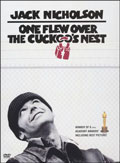
Directed by
Milos Forman
133 minutes
Rated M
Reviewed by
Bernard Hemingway


One Flew Over The Cuckoo's Nest
Based on Ken Kesey's 1962 novel that was one of the iconic texts of the anti-Establishmentarian hippy era, One Flew Over The Cuckoo's Nest was still close enough to the pulse of the times to take out eight Oscars and become the first film since It Happened One Night (1934) to take out the top 5 Oscars - Picture, Director, Actor, Actress and Screenplay - an achievement not repeated until 1991 by The Silence of the Lambs.
Jack Nicholson plays R.P. McMurphy, a freewheeling rouseabout and general trouble-maker serving a stretch in prison who has played “mad” in order to get himself sent to a mental institution for “assessment”. He gets put into a ward overseen by Nurse Ratched (Louise Fletcher) who is determined not to let anyone disrupt her well-ordered regime. And so a clash of wills ensues as the urges of personal freedom and the strictures of society collide.
What makes the film very much of the time (the Vietnam to Watergate era) is that The Establishment wins (the romanticized ending feels too vague to be convincing) and, much as with the ending of 1968’s Easy Rider, the film that kick-started Nicholson’s career, this actually gives the film much more emotional heft than the conventional Hollywood triumphal happy ending, Whilst McMurphy’s machismo is rather stereotypical (his world revolves round cards, baseball and chasing tail) no-one can humanize the larrikin bad-boy the way Nicholson can. Opposite him, Fletcher is equally effective as the by-the-book, passive-aggressive do-gooder Watching them as they slog it out for hte upperhand is the film’s delight, the tragic ending nothwithstanding.
One of the ingredients of the film’s success and staying power is Czech-born director Milos Forman, making his only second English-language film. Well-known for his 1967 anti-bureaucratic satire, The Fireman’s Ball, after which he fled his Communist ruled homeland, he brings a sensibility well-suited to the subject matter, one that knows the power of The State. Indicative of what the film might have been like in the hands of a more mainstream American director, producer Michael Douglas convinced Forman, against his wishes, to proceed with the fishing trip sequence with its rather contrived comic relief. Indeed Kesey, who initially worked on the script fell out with Douglas over its direction and claimed never to have seen the finished product (he also sued the producers for a larger share of the considerable profits).
It is also revealing, in hindsight at least, to learn that Nicholson was only offered the part after it was turned down by Gene Hackman and Marlon Brando. Very little was seen of Louise Fletcher after this film but needless to say Danny De Vito who plays one of McMurphys’s fellow patients, has gone on to be a major Hollywood player whilst Vincent Schiavelli, Christopher Lloyd and Brad Dourif (who was Oscar-nominated for what was his feature film debut) have all had solid careers as character actors.
FYI: Dourif never fulfilled his promise, starring in John Houston's Wise Blood (1979) and appearing in a smaller role in Michael Cimino's Heaven's Gate (1980) before gradually fading from view.
Want something different?





